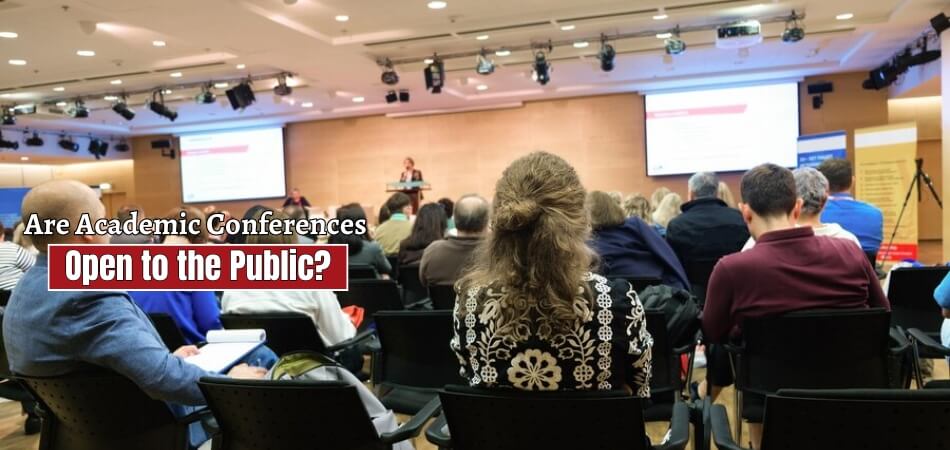It is possible to make a significant impact on your career by attending an academic conference. It’s a chance to dive deep into your field, connect with experts, and spark new ideas. These gatherings offer invaluable insights that can drive your knowledge and career forward. But you might be wondering: are academic conferences open to the public?
The answer isn’t one-size-fits-all. Some conferences welcome everyone, often with a registration fee, while others are reserved for scholars and professionals. Many adopt a hybrid approach, featuring public sessions alongside exclusive workshops. It’s always a good idea to check the conference website for specific details on attendance.
Interested in learning more about the world of academic conferences? Read on to discover how you can be part of these enlightening events.
Academic Conferences: What Makes It Unique?
Academic conferences are more than just gatherings; they create spaces where researchers, scholars, and professionals share their latest findings. These events allow participants to engage in discussions, exchange knowledge, and gain insights from experts in their fields. Unlike casual meetups, they focus on structured presentations, fostering meaningful intellectual conversations and professional growth.
One of the key aspects of these conferences is the opportunity to present research work. Scholars showcase their findings through papers, posters, or panel discussions. This not only helps in receiving constructive feedback but also opens doors to collaborations. Engaging with peers who share similar interests adds immense value to an attendee’s academic and professional development.
Beyond presentations, academic conferences offer interactive workshops and keynote speeches from industry leaders. These sessions provide attendees with deeper insights into emerging trends, helping them stay updated in their fields. Networking events within the conference encourage meaningful discussions, allowing individuals to connect with like-minded professionals and exchange ideas in a structured setting.
Organizers ensure these conferences take place in diverse locations, making them accessible to a global audience. Events like conferences in Canada, USA, and many other leading conference hosting countries attract participants from different backgrounds, providing an inclusive environment for discussions. With well-equipped venues and academic institutions hosting such events, attendees benefit from both knowledge exchange and a comfortable learning experience.
Types of Conferences Considered as Academic Conferences
Academic conferences come in many forms, each tailored to unique audiences and goals. While some focus on sharing the latest research, others encourage interdisciplinary learning or professional development. Here’s a look at the main types of academic conferences and what they offer.
Research Conferences
Research conferences emphasize presenting new findings, offering researchers a platform to share their latest studies and insights. Attendees gather to discuss emerging theories, methods, and data within their specific fields. These conferences often include presentations, posters, and panel discussions that invite audience engagement. Researchers benefit from feedback, making it a valuable space for refining ideas.
Professional Development Conferences
These conferences center on skill-building and advancing careers through targeted workshops, seminars, and hands-on training sessions. Attendees can acquire practical tools and strategies applicable to their professional lives and studies. Sessions focus on evolving best practices, industry trends, and networking for career growth. This type of conference helps attendees stay competitive in rapidly changing fields.
Interdisciplinary Conferences
Conferences encourage collaboration across various fields, bringing together scholars from different academic backgrounds. Participants can explore intersections between fields like technology, medicine, or humanities, gaining broader perspectives. These events foster innovative ideas by combining knowledge from multiple disciplines, often leading to unexpected insights. It’s a chance to break traditional boundaries and inspire creative approaches.
Symposiums
Symposiums offer in-depth exploration of a specific topic or theme within a scholarly framework, making them highly focused events. Scholars, researchers, and students discuss each aspect of the theme, fostering deep understanding. Unlike other conferences, symposiums often have fewer participants to encourage intimate and intensive discussions. This format provides a unique learning experience through the analysis of the subject matter.
Workshops
Workshops focus on hands-on learning and skill development through interactive sessions, making them highly practical and engaging. Participants work directly with experts, receiving individualized guidance and immediate feedback on their skills. Unlike traditional presentations, workshops emphasize the direct application of knowledge through exercises and activities. This makes them ideal for those seeking a more experiential approach to learning.
Are Academic Conferences Open to the Public?
Academic conferences offer a unique chance to learn, share ideas, and connect, but they aren’t always accessible to everyone. While some welcome public attendees with a registration fee, others restrict access to scholars or professionals only. Understanding the factors that determine access can help you find the right conference for your goals.
Purpose of the Conference
The purpose of a conference often influences whether it’s open to the public or restricted. Conferences focused on academic research may limit access to maintain scholarly discussions. Others, aimed at outreach or knowledge sharing, might welcome broader audiences interested in specific topics.
Purpose-driven events also determine the conference format and topics to engage the right audience. Sessions might include lectures, workshops, or interactive discussions that align with attendee goals. Public conferences often create opportunities for learning, networking, and collaboration across various backgrounds.
Target Audience
Conferences design their programs around a target audience, shaping their accessibility and relevance for attendees. Events customized for experts might require specific credentials to ensure high-level discussions. In contrast, more general-interest conferences may open access to anyone interested.
For events targeting professionals, topics, and materials are usually advanced, aligning with specialized knowledge areas. This type of audience segmentation allows deeper dives into subjects that interest industry experts. However, broader conferences focus on inclusivity, encouraging diverse perspectives in the sessions.
Registration Fees and Financial Requirements
Fees can significantly impact eligibility for attending academic conferences, as they vary based on exclusivity and funding. Some conferences require high fees, aiming to support event costs and limit attendance to serious participants. Other events, especially public-focused ones, have lower or no fees to increase accessibility.
Organizers may adjust fees based on attendee status, offering discounts to students or early registrants. This structure helps manage attendance while supporting wider access for interested groups. Financial flexibility encourages a mix of attendees, enhancing discussions and learning opportunities.
Membership Requirements
Certain conferences require attendees to belong to a specific organization or academic group to participate fully. Membership requirements can limit access to specialized groups, like industry professionals or association members. This ensures discussions are relevant to those within the field and maintain a certain standard.
Some organizations use these conferences as member benefits, allowing access as part of membership dues. Members often enjoy additional privileges, such as exclusive workshops or networking events. Conferences open to members-only might offer a deeper, more targeted experience.
Location and Accessibility
The location of a conference can influence who can attend, especially if travel is involved. Conferences held at university campuses or specific venues may limit attendance to those nearby or willing to travel. Virtual or hybrid options increase accessibility, allowing broader participation across geographical boundaries.
Some organizers plan conferences in centralized locations to attract international attendees from diverse backgrounds. The accessibility of these events improves engagement, allowing more voices to participate in discussions. Hybrid formats offer the flexibility of attending from anywhere, increasing inclusivity.
Pre-Approval and Application Requirements
Some conferences require pre-approval or applications, ensuring attendees meet specific eligibility criteria before attending. Conferences might have application processes that screen for academic background or relevant expertise. This helps organizers maintain event quality and relevance to the intended participants.
Applications also help manage limited space, selecting those with aligned interests and goals. By requiring applications, conferences can tailor sessions more effectively to attendee needs. Screening processes enhance conference quality, aligning participation with event objectives.
Who Should Attend the Academic Conference?
Academic conferences are incredible opportunities for individuals looking to expand their knowledge, network, and professional skill set. Different types of people can benefit from these gatherings, each with unique goals. Here’s a look at who should consider attending an academic conference and why.
Researchers and Academics
Researchers and academics attend conferences to share findings, gather insights, and stay updated on trends in their fields. These events provide an excellent platform for presenting research and gaining feedback from peers. They also encourage collaborative discussions that may inspire future research and innovation. For researchers, conferences are essential spaces for professional growth and networking opportunities.
Graduate and Postgraduate Students
Graduate and postgraduate students can benefit tremendously from attending academic conferences in their fields of study. Conferences provide exposure to current research and introduce students to valuable networking opportunities. Many events include sessions where students can present their work and gain critical feedback. This exposure helps students build confidence and make connections for future careers.
Industry Professionals
Industry professionals attend academic conferences to stay updated on new research, trends, and methods impacting their work. Conferences allow professionals to gain insights into academic advancements that can improve their practical applications. Engaging with academics also provides fresh perspectives that can drive innovation within their industries. This exchange of ideas fosters growth and enhances professional knowledge.
Educators and Teachers
Educators and teachers benefit from conferences by exploring new methods, tools, and approaches to enrich their teaching practices. Conferences often feature sessions on best practices, curriculum developments, and emerging trends in education. Teachers can gain insights to enhance student engagement and learning outcomes in their classrooms. Networking with other educators also enables idea-sharing for classroom innovations.
Policymakers and Government Representatives
Policymakers and government representatives attend academic conferences to understand emerging trends and research that may impact public policy. These conferences offer access to experts in fields relevant to societal and environmental issues. Attendees gain insights into studies that can guide policy decisions for public benefit. This helps bridge the gap between research findings and practical implementation.
Aspiring Academics and Young Researchers
Aspiring academics and young researchers attend conferences to gain early exposure to their academic fields and connect with mentors. Conferences help them understand the landscape, challenges, and opportunities in their chosen disciplines. Many events provide spaces where young researchers can present preliminary work and receive valuable feedback. This experience builds confidence and lays a strong foundation for future pursuits.
How to Complete the Registration for The Academic Conference?
Registering for an academic conference can seem overwhelming, but a few clear steps will make the process smooth and efficient. Each part of registration serves a purpose, from initial research to final preparation. Here’s a step-by-step guide to help you successfully register and attend your next academic event.
Step 1: Research the Conference
Start by researching the conference thoroughly on the organizer’s website, ensuring it aligns with your interests and goals. You’ll find different kinds of academic conferences based on their topics and trends. So it’s essential to do some background research to ensure you’re selecting the conference that aligns with your study or fields.
Step 2: Complete the Registration Form
Locate and carefully fill out the registration form on the conference website, paying attention to each field. Provide accurate personal and professional details to avoid any issues during the check-in process. Double-check your entries to catch any errors or typos before submission. Taking a little extra time here can prevent potential delays or problems.
Step 3: Make the Payment
Once you complete the form, proceed to the payment section and select a suitable method to finalize the registration. Ensure the payment goes through smoothly and confirm you receive a receipt as proof. Having this receipt is essential in case of any discrepancies or questions. This step solidifies your spot and is key to moving forward with your registration.
Step 4: Await Confirmation
After submitting your form and payment, look for a confirmation email from the conference organizer. This email usually contains vital details like your registration ID and event-specific instructions. Keep an eye on your inbox and check your spam folder if it doesn’t arrive promptly. Confirmation assures you that everything has been processed correctly.
Step 5: Verify Registration Details
Review the confirmation email to ensure all personal and affiliation details are correct and as intended. Carefully check your name spelling, organization, and any listed session preferences. Contact the organizer immediately if you notice any discrepancies to have them resolved. Taking this step guarantees accuracy for smooth check-in and participation.
Step 6: Prepare for the Conference
your registration is confirmed, begin planning your travel, accommodation, and conference materials. Review the conference schedule to decide on specific sessions or networking events you want to attend. Preparation helps you make the most of the event and avoid last-minute stress. A well-organized plan will enhance your conference experience.
Step 7: Attend the Conference
On the day of the conference, aim to arrive early to allow ample time for check-in and settling in. Head to the registration desk, where you can collect any materials or passes provided. Engage actively with sessions and make the most of networking opportunities. This is the culmination of your preparation, so enjoy the experience!
The Benefit of Attending the Academic Conferences
Academic conferences offer a unique opportunity to deepen your knowledge, meet professionals, and explore new ideas in your field. These events are designed to facilitate growth, networking, and fresh perspectives for personal and professional development. Here are some key benefits of attending academic conferences that can enrich your journey.
- Gain exposure to new research that expands your understanding and opens doors to innovative ideas in your field.
- Connect with like-minded professionals who share your interests, creating lasting relationships that support collaborative opportunities.
- Engage in discussions with experts, gaining insights into trends, challenges, and future directions in your area of study.
- Develop communication skills by presenting your own work, receiving feedback, and learning how to convey ideas effectively.
- Participate in workshops that build hands-on skills, enhancing your abilities and preparing you for real-world applications.
- Broaden your perspectives by attending sessions across diverse disciplines, which can inspire new approaches to your work.
The experience of attending an academic conference offers both professional growth and personal enrichment. Embracing these opportunities can leave a lasting impact on your career and future aspirations.
Frequently Asked Questions About Are Academic Conferences Open to the Public?
Academic conferences are often gateways to learning, networking, and discovering new ideas. While some are open to all, others have specific entry requirements. Here are some frequently asked questions about the public accessibility of academic conferences.
Can Anyone Register for an Academic Conference?
Yes, many conferences are open to the public, allowing anyone to register with a fee. However, some are exclusive to certain professionals or students, so it’s always important to check eligibility details on the conference’s official website.
Do All Conferences Require Membership for Attendance?
Not all conferences require membership, though some specific ones do. Certain academic organizations hold member-only events, while others welcome non-members, often with a higher registration fee. Review conference guidelines to understand membership requirements for attending.
Are There Conferences Exclusively for Students or Researchers?
Yes, some conferences are designed specifically for students or researchers, focusing on academic research and specialized topics. These events may limit access to professional standards, although some general-interest conferences include sessions open to broader audiences.
Do Virtual Conferences Have Different Accessibility Than In-Person Ones?
Virtual conferences often have broader accessibility, allowing more people to attend without geographic restrictions. Many virtual events are open to the public with registration, while others remain exclusive, so always verify details about public access when registering online.
Are There Any Free Academic Conferences Available to the Public?
Yes, some academic conferences offer free access, especially if they’re publicly funded or supported by educational institutions. These free events can be a great opportunity for students and enthusiasts to gain exposure to academic topics without financial constraints.
Concluding Thoughts
Attending an academic conference can greatly enhance your professional growth, networking opportunities, and knowledge of current trends. These events provide a unique platform to connect with peers, engage in deep discussions, and gain fresh perspectives. If you’re wondering, are academic conferences open to the public? – the answer varies, with some conferences welcoming all, while others remain exclusive.
Checking the conference details is essential to understand access requirements and determine if it’s the right fit for your goals. Embracing the chance to attend a conference can inspire new ideas, build connections, and leave a lasting impact on your career.








